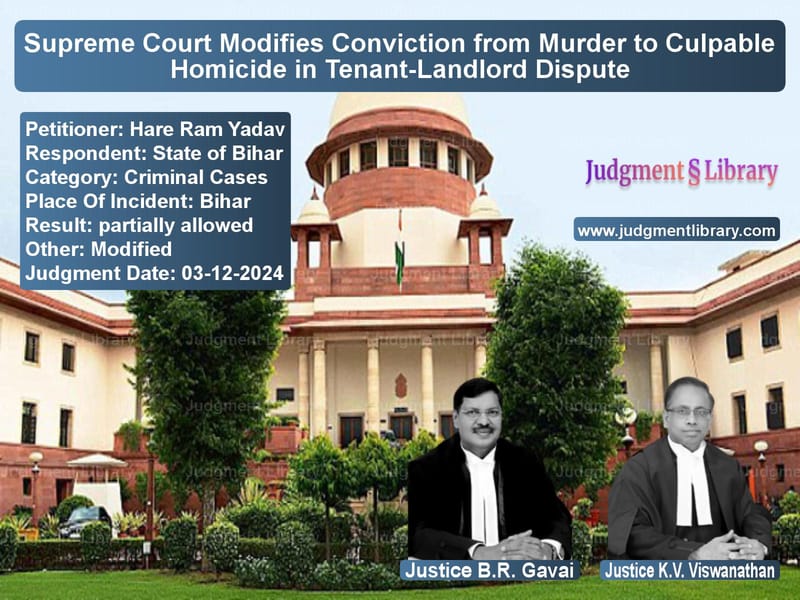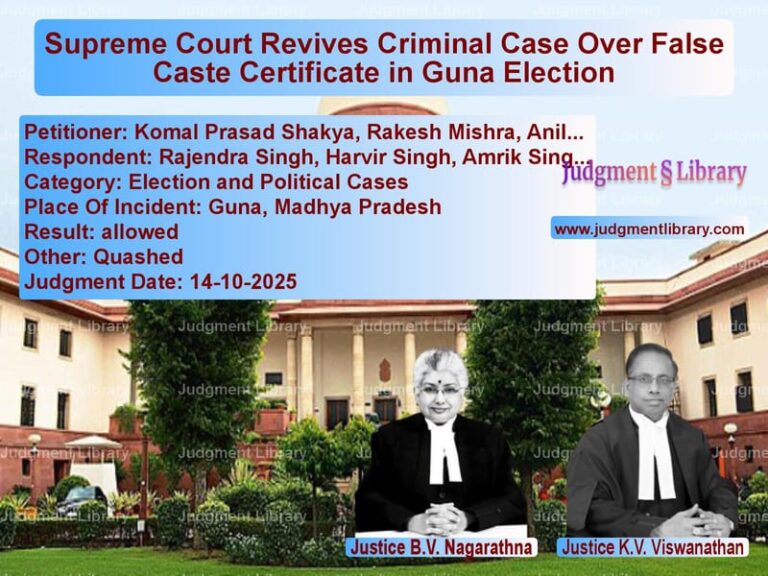Supreme Court Modifies Conviction from Murder to Culpable Homicide in Tenant-Landlord Dispute
The case of Hare Ram Yadav vs. State of Bihar revolves around an unfortunate altercation between a tenant and a landlord’s family that escalated into violence, leading to the tragic death of a woman. The appellant, Hare Ram Yadav, was convicted under Section 302 of the Indian Penal Code (IPC) and sentenced to life imprisonment. However, after multiple appeals and judicial scrutiny, the Supreme Court reduced his conviction from murder to culpable homicide not amounting to murder, altering the sentence accordingly.
The case presents crucial insights into legal interpretations regarding premeditation, provocation, and the scope of Section 304 Part I of the IPC. It also highlights the principles governing revisional jurisdiction and how courts must assess cases involving heated altercations.
Background of the Case
On November 9, 2015, at around 10:00 a.m., an argument erupted between the appellant, Hare Ram Yadav, and the family of PW-5, Ranglal Yadav, whose wife was the deceased in the case. The dispute was over the removal of bricks from the appellant’s door. Enraged by this act, the appellant started hurling abuses at the deceased. When she objected, he stabbed her in the chest with a knife, causing grievous injuries. The deceased was taken to a nearby hospital but succumbed to her injuries during treatment.
Following the incident, an FIR (No. 221 of 2015) was lodged on the same day at Manjhi Police Station, and a charge sheet was filed after an investigation. The case was committed to the Sessions Court, which found the appellant guilty under Section 302 of the IPC and sentenced him to life imprisonment. The conviction was subsequently upheld by the Patna High Court.
Arguments Presented Before the Supreme Court
Arguments by the Appellant
- The prosecution witnesses, including five eyewitnesses, were all related to the deceased, making their testimonies biased and unreliable.
- No physical evidence apart from oral testimonies was available to implicate the appellant.
- The alleged murder weapon (knife) was never recovered, further weakening the prosecution’s case.
- The incident happened in the heat of the moment, without premeditation, which should classify the act under Section 304 IPC (Culpable Homicide), not under Section 302 IPC (Murder).
Arguments by the Respondent (State of Bihar)
- There were five direct eyewitnesses whose testimonies remained consistent under cross-examination.
- The injury was inflicted on the chest, a vital organ, demonstrating an intent to kill.
- The appellant’s act was deliberate, as he chose to attack the victim with a knife after she confronted him.
- The lower courts rightly convicted the appellant under Section 302 IPC.
Supreme Court’s Analysis
The Supreme Court carefully examined the case, particularly focusing on whether the conviction under Section 302 IPC was appropriate. The key observations made by the Court included:
- Reliability of Witnesses: The Court ruled that merely being relatives of the deceased does not discredit the testimony of witnesses. Their statements were consistent under cross-examination.
- Nature of the Incident: The altercation was sudden and triggered by provocation. The deceased’s own words, challenging the appellant to kill her, played a role in escalating the situation.
- Absence of Premeditation: The Court noted that the crime was not preplanned but occurred in the heat of passion during a sudden quarrel.
- Exception to Section 300 IPC: The Court found that the case fell under the exception to Section 300 IPC, which applies when a murder occurs in a grave and sudden fight.
- Extent of Injury: The appellant inflicted only a single fatal wound, and there was no evidence of undue cruelty or intent to cause further harm.
Supreme Court’s Judgment
Based on the above analysis, the Supreme Court modified the conviction as follows:
- The conviction under Section 302 IPC was altered to Section 304 Part I IPC (Culpable Homicide Not Amounting to Murder).
- The appellant was sentenced to the period already undergone (approximately nine years and ten months).
- The Court ordered the immediate release of the appellant, subject to any other pending cases.
Legal Implications of the Judgment
This case underscores the importance of distinguishing between murder and culpable homicide based on intent, provocation, and premeditation. The Supreme Court’s decision reflects a balanced approach that acknowledges the gravity of the offense while considering mitigating factors.
In its ruling, the Court reiterated the principle that while circumstantial evidence can be persuasive, it must be evaluated in light of the facts and the immediate circumstances surrounding the crime. The judgment serves as a precedent for future cases where provocation and sudden quarrels lead to homicide.
Judges: B.R. Gavai, K.V. Viswanathan
Petitioner Name: Hare Ram Yadav.Respondent Name: State of Bihar.Judgment By: Justice B.R. Gavai, Justice K.V. Viswanathan.Place Of Incident: Bihar.Judgment Date: 03-12-2024.
Don’t miss out on the full details! Download the complete judgment in PDF format below and gain valuable insights instantly!
Download Judgment: hare-ram-yadav-vs-state-of-bihar-supreme-court-of-india-judgment-dated-03-12-2024.pdf
Directly Download Judgment: Directly download this Judgment
See all petitions in Murder Cases
See all petitions in Attempt to Murder Cases
See all petitions in Judgment by B R Gavai
See all petitions in Judgment by K.V. Viswanathan
See all petitions in partially allowed
See all petitions in Modified
See all petitions in supreme court of India judgments December 2024
See all petitions in 2024 judgments
See all posts in Criminal Cases Category
See all allowed petitions in Criminal Cases Category
See all Dismissed petitions in Criminal Cases Category
See all partially allowed petitions in Criminal Cases Category







